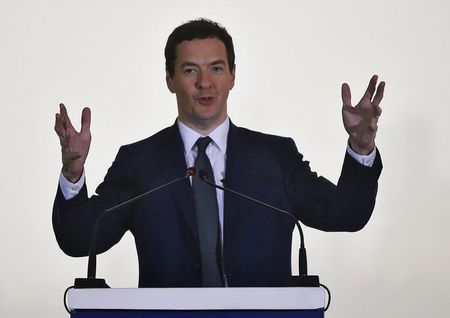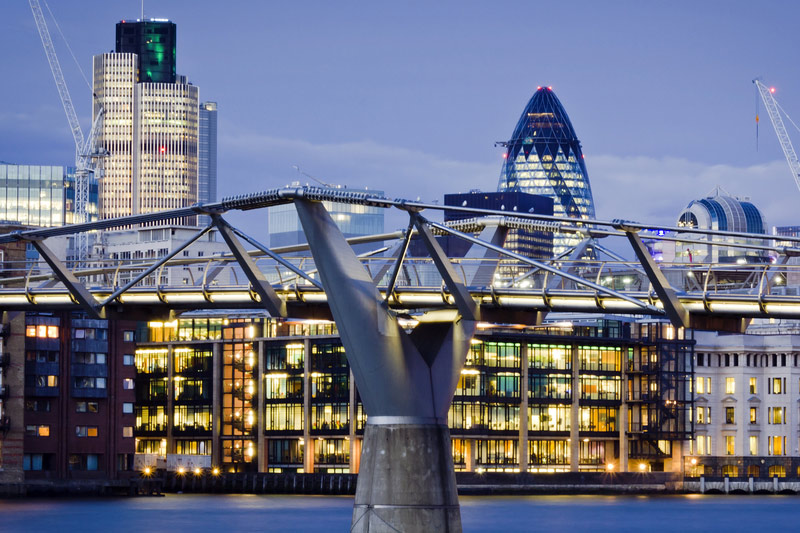By Swati Bhat
MUMBAI (Reuters) - Britain's finance minister George Osborne praised India's new prime minister Narendra Modi on Monday for helping create a quick turnaround in investor sentiment, during a two-day trip aimed at opening up opportunities in defence and infrastructure.
Along with most western nations, Britain shunned Modi for years after he was accused of not doing enough to stop religious riots that killed hundreds in his home state of Gujarat in 2002, when he was its chief minister.
But London was one of the first to break ranks and send officials to meet Modi before the election he won in May.
The ruling Conservative Party-led alliance now wants to build on that goodwill with the visit by Osborne and Foreign Secretary William Hague. Both ministers are due to meet Modi in New Delhi on Tuesday.
"Prime Minister Modi is seeking more investment in India's economy - and I want British companies to provide it, and the British government to support it," Osborne said.
An efficient administrator who oversaw fast economic growth in Gujarat, Modi is feted by business and his election success has triggered a series of records for Indian stocks, despite the long economic downturn he inherited.
Modi denies accusations he was complicit in the Hindu-Muslim riots that killed at least 1,000 people. A Supreme Court investigation did not find evidence to prosecute him.
Speaking in the financial capital Mumbai, Osborne said Britain had concluded a 250 million-pound deal to supply defence equipment to the Indian Air Force and highlighted a 1 billion-pound investment by Diageo in Indian distillery United Spirits.
Indian officials were not immediately able to say what defence deal he was referring to.
London is hoping a stalled deal for India to buy 126 French Rafale fighter jets may yet collapse, perhaps opening the door to a new arrangement involving the Eurofighter Typhoon jet, which is partly built in Britain.
It also wants British firms to help India develop new urban centres along a 1,000-km (600-mile) corridor between Mumbai and Bangalore.
Osborne said he would give details on Tuesday of a new mechanism to offer guarantees for rupee-denominated export finance, part of British assistance he said was aimed at making the rupee an international currency. The Indian rupee is not currently a fully convertible currency.
COURTED BY THE WEST
The arrival of the two senior British ministers was the latest in a series of high-profile visits by foreign governments scrambling to repair relations with Modi - who won a landslide victory in May - and to position themselves for a possible further opening up of India's defence industry.
Britain's economy, the world's sixth largest, is expanding at one of the fastest rates in the Western world. But the country is weighed down by large public debts and Prime Minister David Cameron has said it needs to forge closer links with developing economies such as India's to secure its future.
"We want British firms ... to help develop your new roads, railways and ports, and our defence and aerospace companies to help bring India more cutting-edge technology, skills and jobs," the two ministers said in a jointly-authored column in the Times of India newspaper on Monday.
Osborne announced research and development investment in Britain for electric vehicles by automotive giant Mahindra and pharmaceutical company Cipla to the tune of 20 million pounds and up to 100 million pounds respectively.
A long-festering tax dispute involving Vodafone is expected to be on the agenda in meetings with the government.
India's foreign minister Sushma Swaraj will discuss the situation in Iraq, where 39 Indians have been taken hostage, as well as nuclear negotiations between world powers and Iran when she meets Hague on Tuesday, a ministry spokesman said.
The visit could have an impact on Britain's political scene. Cameron is up for re-election next year and his Conservatives are anxious to woo the country's Indian diaspora, which Hague before his trip estimated was 1.5 million-strong.

In 2013, Britain exported goods and services worth 7.7 billion pounds to India and imported goods and services from India worth 8.8 billion pounds.
Britain, India's former colonial power, is the third biggest investor after Singapore and Mauritius. But, the two British ministers wrote in the Times of India, it sells less to India than it does to Switzerland.
(Additional reporting by Andrew Osborn and Limei Hoang in London; Writing by Frank Jack Daniel; Editing by Andrew Roche)
